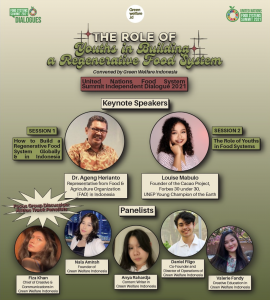Type of Dialogue
Convened by
Language of Dialogue Event
Date/time
To:
Geographical focus
Format
Please review the details below for registration information if available or contact the Convenor if you would like to attend.
Curator
Description
REGISTER NOW
Engagement of youth is the key in making the transition towards sustainable and healthy agriculture and food systems. It is estimated that more than 2 billion children will be born worldwide between 2015 and 2030. The majority of these children will be in sub-Saharan Africa and South Asia, where agriculture and food systems constitute the largest employer, and where the needs in terms of availability, access and quality of food and nutrition are greatest. There is a large untapped reservoir of employment opportunities in the agri-food sector which is increasingly pinched by significant labour constraints in many areas of the world. Yet, due to limited access to land, natural resources, infrastructure, finance, technology, markets, knowledge, and poor working conditions the sector cannot be considered attractive and sustainable for youth. There is a high incidence of informality, casual labour, underemployment, child labour, forced labour, working poverty, and among the lowest rates of access to social protection and unionisation in the agricultural sector. Quite often, young women, once married, are mostly engaged in farming, often for subsistence, while young men exit the sector in search of other income opportunities and greater autonomy. Discriminatory traditional and cultural norms leave women disadvantaged as regards access to productive resources, limiting their ability to innovate on their farms. It is then important to better understand aspirations of the youth, differentiated by gender, class, ethnicity and other forms of difference, to enable sustainable food systems.
As the global average age of these farmers approaches 60 years, it is essential to develop systems, policies, and programmes that encourage the engagement of youth in agriculture and food systems and related professions, including research and innovation. These should provide spaces and mechanisms for participation, and opportunities for entrepreneurship. Traditional subsistence agriculture is not attractive to the youth and it is essential to transform agriculture and food systems in a way that is intellectually challenging and economically rewarding. Retaining youth in agriculture also requires improving living standards and quality of services in rural areas and mid-sized town.
Engagement and leadership of young women and men in agriculture and food systems is essential as youth need to be recognized as agents of change and not only as receivers of assistance and support. Youth participation in decision making related to agriculture and food systems requires changes to the enabling environment, through the institution of specific mechanisms to allow the voices of youth to be heard; and recognition of the social, economic, cultural and political status of youth, to allow them to fully participate. The legislative and institutional environment influences the respect of young people’s rights, working conditions, job creation and youth engagement. Coherence between sectoral and employment policies and legislation needs to be promoted to ensure that there are no conflicting objectives in different policies, and that policies reinforce one another.
KEYNOTE SESSIONS
(Session 1: How to build a Regenerative Food System globally and in Indonesia) Dr. Ageng Herianto – Representative from Food & Agriculture Organization (FAO) of the UN in Indonesia
(Session 2: The role of youths in Food Systems) Louise Mabulo – Founder of the Cacao Project, Forbes 30 under 30, UNEP Young Champion of the Earth
YOUTH PANELISTS
Nala Amirah, Daniel Filgo, Fiza Khan, Valerie Fandy, Anya Rahardja
HOSTED BY
Trisha Ramadhania & Maria Setiawan


